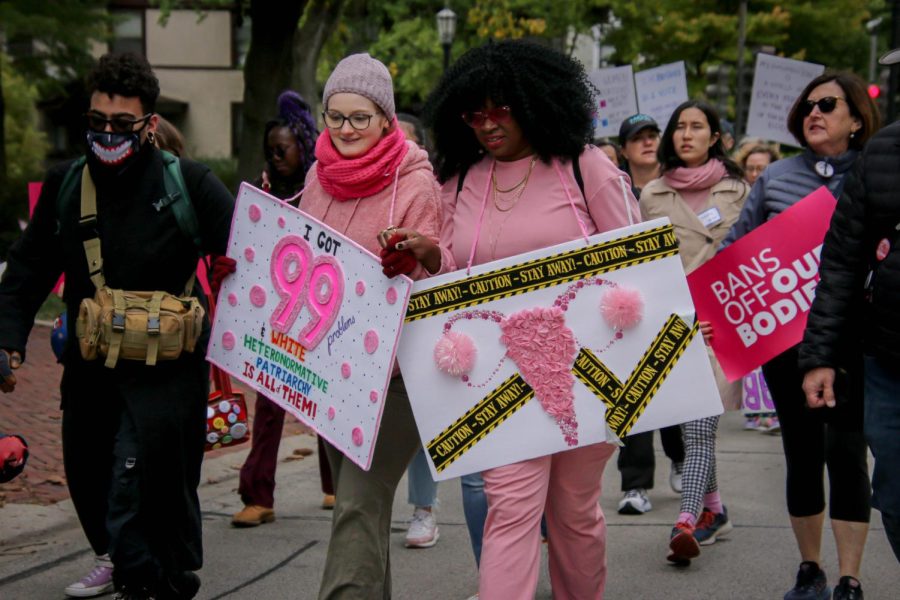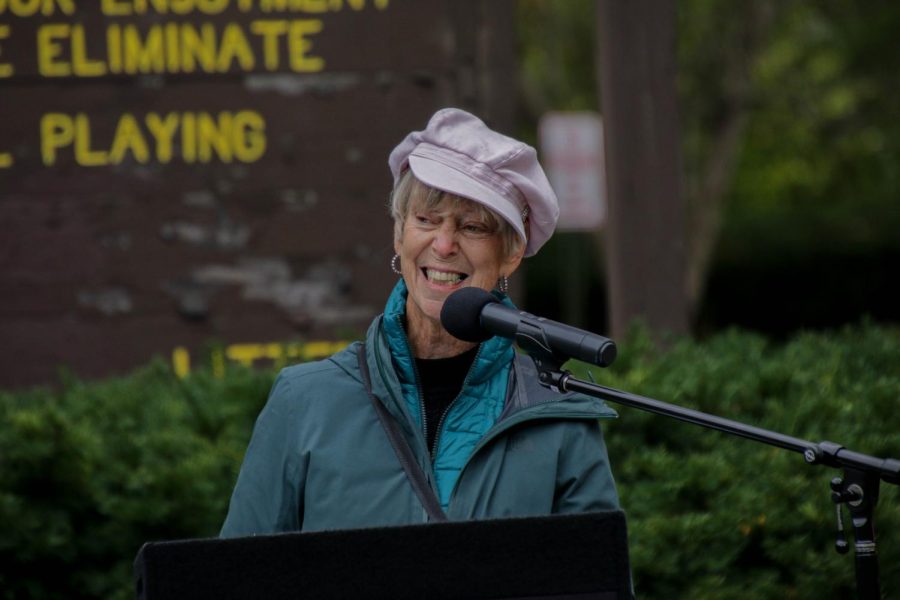Demonstrators gather for rally and march to defend abortion access
Angeli Mittal/Daily Senior Staffer
Evanston’s march for reproductive rights brought together a hundred pro-choice advocates Sunday afternoon.
October 16, 2022
Music teacher Paula McKernan, locally known as “Paula the Bard,” stepped up to the microphone on Sunday, ukulele in hand, and started to sing her original song “Women Choose.” in front of hundreds of pro-choice demonstrators.
“Trust your sister, trust your lover, trust your mother, trust your wife,” McKernan sang. “Trust our reasons and decisions. Trust us to choose a healthy life.”
Evanston residents, community activists and politicians including Mayor Daniel Biss and Illinois Lt. Gov. Juliana Stratton gathered at Raymond Park and marched to protect reproductive justice and health.
Evanston resident Gretchen Brewster ran the rally in partnership with co-sponsors Evanston Pride, Illinois National Organization for Women, She Votes Illinois and other organizations.
Following the Dobbs v. Jackson Women’s Health Organization decision, which reversed the federal right to an abortion, states bordering Illinois like Wisconsin and Indiana have implemented near-total bans or heavy restrictions on abortion access.
This has increased the number of people coming from out-of-state to Illinois seeking abortion. While abortion laws in Illinois are unrestricted, 90% of counties in Illinois did not have an abortion provider in 2020, according to the Guttmacher Institute, a reproductive rights think tank. The majority of the state’s abortion providers are located in the Chicago metropolitan area.
“It’s been so hurtful in our country and so divisive,” McKernan told The Daily. “I want to support our community and help our country heal and stop hurting women.”
Gov. J.B. Pritzker has said he plans on continuing to ensure equal access to abortion for individuals both in-state and out-of-state. Pritzker increased Medicare reimbursement rates for abortion services in August following the decision.
After speakers and performers opened the event, demonstrators marched through the streets of Evanston to Mason Park.
Stratton said during a speech that she was inspired by the turnout at the rally. Stratton said she will continue to fight for reproductive rights –– she said she thinks that Dobbs is the start of a series of human rights limitations to come.
“We know it’s those from our most marginalized communities that are bearing the brunt of this decision,” Stratton said. “I’m talking about Black women, brown women, Indigenous women, young women, women trying to make ends meet, immigrant women, women with disabilities, trans and nonbinary people.”
Stratton added she and Pritzker considered the possibility of the overturn of Roe v. Wade when they took office. According to her, that possibility was why they enshrined reproductive freedoms into state laws, like the Reproductive Health Act of 2019, which guaranteed Illinois residents the fundamental right to make decisions about their own reproductive health.
Attendee and attorney Erin Jackson said she thinks the post-Dobbs legal landscape is extremely uncertain, and continuously changing trigger laws across the country are terrifying.
“I think this is a special community that stands for choice and I’m proud to be part of,” Jackson told The Daily. “I think it’s important even in communities where choice isn’t directly threatened that people stand up.”
Josina Morita, commissioner for the Metropolitan Water Reclamation District of Greater Chicago, said she’s learned community members have to stand together and fight.
“It terrifies me as a mother, the choices that she will have to make, and the choices that may be made for her and all of our children,” Morita said about her daughter. “We will not be the first generation to have our children have less rights than we do. We will not go back.”
Speaker Kenyette Tisha Barnes said abortion access is ultimately a basic human right. Barnes called on men to stand up for people in their life who might not have equal access to abortion.
She said it is important to recognize the trans and nonbinary community when discussing abortion access, as oftentimes abortion access movements focus solely on white, cis-gender women.
“(Illinois is) a sanctuary state,” Barnes said. “You are that lone island, in the middle of the country, where people can come and choice is here. It is our job, your job, all of our job to make sure that we stay that way.”
Mayor Daniel Biss said he is taking every possible step to make Evanston the most just place when it comes to reproductive care.
Currently, Evanston does not have an abortion clinic.
“(City Council) does not have the luxury of letting somebody else do the work,” Biss said. “This is such a critical, critical moment for us to all stand up and fight, all understand the stakes, and all engage in every possible way.”
Email: [email protected]
Twitter: @selenakuznikov
Related Stories:
— NU students discuss past and future work in abortion rights post-Roe
— Demonstrators organize to protest anti-abortion lawyer following Roe v. Wade reversal
— Thousands march in downtown Chicago to protest overturning of Roe v. Wade



